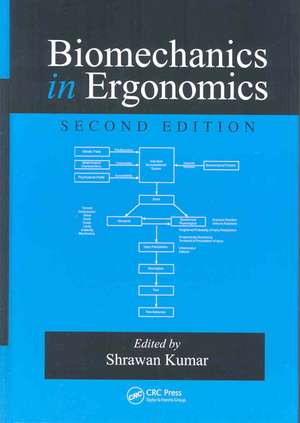Biomechanics in Ergonomics
Editat de Shrawan Kumaren Limba Engleză Hardback – 7 dec 2007
Applications for the Real World
Produced under the aegis of editor Shrawan Kumar with contributors who are leading scholars in the field, the book contains unique chapters such as Exposure Assessment Tools and Techniques and Cumulative Load and Models. Also included is a chapter on hand tools, which have a real application to the field of ergonomics.
New and significantly revamped chapters:
- Theories of occupational musculoskeletal injury causation
- Anthropometry and Biomechanics — Anthropometrics
- Mechanical Exposure Assessment in the Design of Work
- Determinant of Muscle Strength
- Biomechanics of Gloves
- The ACGIH TLV® for Hand Activity Level
- Whiplash Injuries — In Vitro Studies
- Whiplash Injuries — In Vivo Studies
- Models in Manual Materials Handling
- Revised NIOSH Lifting Equation
- Whole Body Vibration
- Cumulative Load and Models
The book dives deep into the biomechanics of the connective tissues before thoroughly covering upper and lower extremities, shoulder and neck, low back, and whole body mechanics. With chapters selected and designed to provide extensive coverage of ergonomically relevant biomechanics, this volume supplies an integrated understanding of the inseparable relationship between ergonomics and biomechanics that can be translated into better safety design and better workplaces.
Preț: 1143.90 lei
Preț vechi: 1395.00 lei
-18% Nou
Puncte Express: 1716
Preț estimativ în valută:
218.91€ • 237.71$ • 183.89£
218.91€ • 237.71$ • 183.89£
Carte tipărită la comandă
Livrare economică 22 aprilie-06 mai
Preluare comenzi: 021 569.72.76
Specificații
ISBN-13: 9780849379086
ISBN-10: 0849379083
Pagini: 742
Ilustrații: 256 b/w images, 112 tables and 12 halftones
Dimensiuni: 178 x 254 x 46 mm
Greutate: 1.45 kg
Ediția:Revizuită
Editura: CRC Press
Colecția CRC Press
ISBN-10: 0849379083
Pagini: 742
Ilustrații: 256 b/w images, 112 tables and 12 halftones
Dimensiuni: 178 x 254 x 46 mm
Greutate: 1.45 kg
Ediția:Revizuită
Editura: CRC Press
Colecția CRC Press
Public țintă
UndergraduateCuprins
General. Theories of Occupational Musculoskeletal Injury Causation. Anthropometry and Biomechanics: Anthromechanics. Mechanical Exposure Assessment in the Design of Work. Tissue Biomechanics. Tissue Mechanics of Ligaments and Tendons. Ligament Sprains and Healing. Bone Biomechanics and Fractures.Determinants of Muscle Strength. Upper Extremity. Functional Anatomy of the Upper Limb (Extremity). Hand Grasping, Finger Pinching, and Squeezing. Hand Tools. Biomechanics of Gloves. Work and Activity-Related Musculoskeletal Disorders of the Upper Extremity. ACGIH TLV for Hand Activity Level. Biomechanical Models of the Hand, Wrist, and Elbow in Ergonomics. Shoulder and Neck. Biomechanical Modeling of the Shoulder Anatomy. Whiplash Injuries: In Vitro Studies. Whiplash Injuries: In Vivo Studies. Low Back. Low Back Disorders. Models in Manual Materials Handling. Revised NIOSH Lifting Equation. Whole Body Biomechanics. Whole Body Vibration. Cumulative Load and Models. Posture. Biomechanics in Work Seating Design. Biomechanics During Ladder and Stair Climbing and Walking on Ramps and Other Irregular Surfaces. Slips, Trips, and Falls. Index.
Descriere
Two of the most important goals of ergonomics are the comfort, and the health and safety of the working population. Written by leaders in the field, this second edition of Biomechanics in Ergonomics presents thoroughly updated and new material regarding the biomechanics of tissues and organs in the workplace. This text establishes a foundation for the understanding of gross biomechanical loads on the human system at the tissue level. It describes biomechanical risk factors and supplies exposure assessment tools and techniques. Comprehensive in scope, the book is suitable for use by ergonomic engineers and physical therapists, and as a textbook for ergonomics courses.





